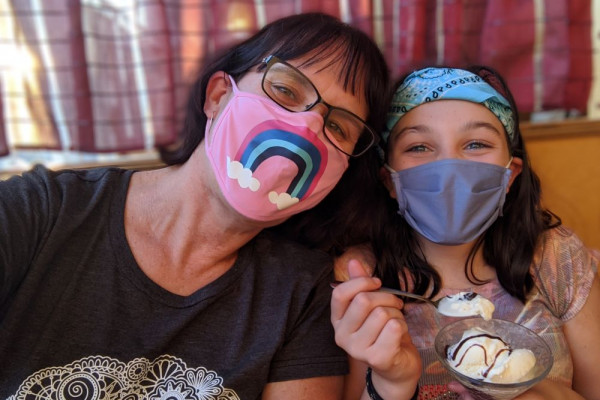The Vermont Community Foundation is seeking proposals from community-based organizations in support of Vermonters’ access to mental health and suicide prevention care.
Read more about "Funding Available for Mental Health and Suicide Prevention Care"Share Our Post:
Pulling back the curtain on Vermont’s Economic Mitigation & Recovery Task Force: A Q+A with VP for Grants & Community Investments Sarah Waring
Provide us with a bit of background on the Economic Mitigation & Recovery Task Force—who is involved and what are you trying to accomplish?
Governor Phil Scott created the Economic Mitigation & Recovery Task Force as COVID-19 began to take hold across Vermont. Our initial marching orders were to provide technical assistance to reduce the immediate economic impacts of the pandemic, as well as develop strategies to speed up the longer-term business and community recovery.
The Task Force’s three committees—known as action teams—are made up of job creators, community leaders, and business representatives from each region in the state, all supported by the Agency of Commerce and Community Development Deputy Secretary Ted Brady, Economic Development Commissioner Joan Goldstein, Housing & Community Development Commissioner Josh Hanford, and public affairs expert and small business owner Dennise Casey.
What action team do you work with?
Two of the action teams have since been disbanded as Governor Scott has continued to “turn the spigot” to re-open the state. I serve on the Local Support and Community Action team, where we’re focused on medium to longer term community recovery.
Right now, every community is grappling with the challenge of meeting immediate needs and minimizing the negative impacts on businesses, municipal budgets, town operations, and the health, vitality, and well-being of residents. Our team connects with organizers on the ground to learn what strategies have been successful and what can be replicated statewide. At the same time, we’re working to identify gaps in recovery efforts to ensure fair distribution of resources, especially in rural areas and for underserved populations.
Can you explain a little bit more about what this process actually looks like?
Sure! The first thing we did was launch a survey—tapping into local community-based organizations for input—to understand the current highest priorities for community rebuilding. We wanted to create recommendations for the Governor, the Agency of Commerce and Community Development, and in some cases, even for Legislative Action. The survey was distributed in partnership with local, municipal, and state entities. In the end, we probably received around 2,500 responses.
Oh wow! What did you learn?
What we discovered was important—Vermonters prioritize high speed broadband, support statewide buy-local efforts, and emphasize aid to those industries hit hardest by economic impacts, such as arts and culture, restaurants, tourism, lodging, and retail. We had thousands of ideas and responses. It was humbling to read through the detailed comments and many themes emerged.
The report identifies “Essential Human and Family Needs” (e.g., food access; youth programming), “Local Business and Economic Recovery” (e.g., buy-local campaigns and business navigators to help with federal relief programs), and “Long-term Telecommunications Infrastructure” (e.g., high speed digital access for all corners of Vermont) as the most critical investments we can make now to ensure Vermont is more resilient against similar disruptions in the future.
At the same time, we were scouring the state to identify the best community recovery strategies to promote them as models for other parts of the state. This spring, we launched a website compiling many of these community strategies broken down into three categories: “Meeting Immediate Community Needs”, “Supporting Local Businesses,” and “Supporting Long-term Economic Resilience and Recovery”.
You’ve been busy! And I’m assuming there is more?
Certainly! Since then, we have partnered with local steering committees to design a series of Community Recovery Visits, which are online forums that can accommodate hundreds of citizens and neighbors to discuss key challenges and ideas for community response and equitable economic recovery. The forums are also an opportunity to connect with other community organizers, as well as meet with a “Visiting Team” of state, federal, business, and non-profit leaders who can surface recovery strategies from across the state and then bring those back to the state house.
What amazing work, and I’m sure so informative for the Community Foundation’s grantmaking. How has this experience been for you?
What’s been so exciting for me has been engaging with small business owners, restauranteurs, consultants, and state agency staffers. I’ve been particularly impressed with the selflessness of the individuals who have been working in the agencies—Commissioner Hanford, Director Cochran and their colleagues—who are on the frontlines for Vermont’s business, housing, and community organizations. Having these dedicated folks working alongside an entrepreneur from the Northeast Kingdom, a business owner from southern Vermont, and our state’s Executive Director of Racial Equity has made for deep, rich conversations.
What’s been most informative for my role at the Community Foundation is being a part of conversations that are thinking about all aspects of Vermont’s community life—job creation, housing, entrepreneurship, cultural awareness, education, and more. As we wrestle internally with our grantmaking, it’s been extremely important for me to see the connections that these excellent colleagues are making to inform our work, too. For example, one of our areas of interest for a transformational initiative for Vermont is granting for universal internet access. I’ve now had the chance to go much deeper in that work through the connection to the Task Force.
Why do you think now is the right time for this type of Task Force?
This Task Force has been successful at bringing together organizations and leaders to share expertise and collaborate on solutions at a time of incredible disruption to our lives and livelihoods. When we coordinated the statewide survey, individuals on the team either completed translation or found funding to complete translation—something that is not always possible with limited resources. Staff from multiple organizations have pitched in to crunch data and analyze results. And the local members of the Task Force are our boots-on-the-ground, gleaning information from across the state to help guide our work.
Is there any piece of work you’re particularly jazzed about?
I’m most proud of the newest piece of work to come from the team. Part of our charge was to focus on marginalized populations—Vermonters who are left behind—both geographically and/or because their identity or social conditions exclude them. As the pandemic impacts have become more obvious, we’ve seen disparate conditions across the state based on wealth, health, race, and geography, and we’ve seen an increase in polarized local interactions as frustration and isolation continues. With municipalities now facing instances of racism, hatred, or even violence, the task force decided to put some community engagement tools in the hands of Vermonters.
We have published a set of engagement tools—designed to be evolving—that can be a starting point for people to come together to build social capital locally. The goal is to focus on the positive in our communities and lean on tools that help ensure inclusivity and vibrancy. This feels like a product that could not have come at a better time or place and is vitally important to this moment in our shared experience.
What inspired you to accept the invitation to participate on the Task Force?
While I was honored to be nominated to serve on this Task Force team, I felt inspired to do it because of the commitment that I share with the entire team at the Vermont Community Foundation—to see a long term recovery for Vermont that gets us to an even better and more equitable place, with vital and viable communities, than we were before COVID-19 began. This moment is one of transformation for Vermont, and it’s exciting to be playing a part towards that.


